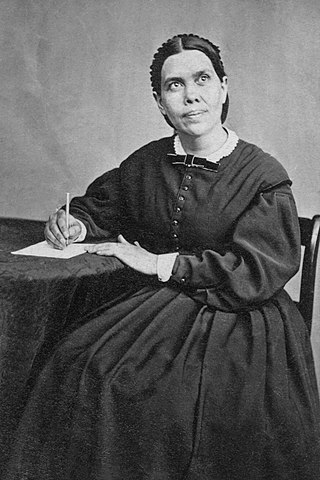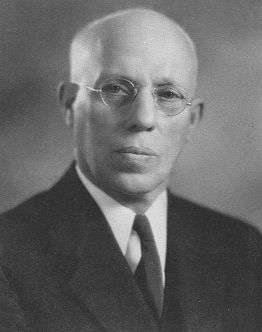
Ellen Gould White was an American author and co-founder of the Seventh-day Adventist Church. Along with other Adventist leaders such as Joseph Bates and her husband James White, she was influential within a small group of early Adventists who formed what became known as the Seventh-day Adventist Church. White is considered a leading figure in American vegetarian history. Smithsonian named her among the "100 Most Significant Americans of All Time".

The Seventh-day Adventist Church had its roots in the Millerite movement of the 1830s to the 1840s, during the period of the Second Great Awakening, and was officially founded in 1863. Prominent figures in the early church included Hiram Edson, Ellen G. White, her husband James Springer White, Joseph Bates, and J. N. Andrews. Over the ensuing decades the church expanded from its original base in New England to become an international organization. Significant developments such the reviews initiated by evangelicals Donald Barnhouse and Walter Martin, in the 20th century led to its recognition as a Christian denomination.

John Nevins Andrews was a Seventh-day Adventist minister, the first official Seventh-day Adventist missionary, writer, editor, and scholar. Andrews University, a university owned and operated by the Seventh-day Adventist church, is named after him.
In Seventh-day Adventist theology, there will be an end time remnant of believers who are faithful to God. The remnant church is a visible, historical, organized body characterized by obedience to the commandments of God and the possession of a unique end-time gospel proclamation. Adventists have traditionally equated this "remnant church" with the Seventh-day Adventist denomination.

The Seventh-day Adventist Church holds a unique system of eschatological beliefs. Adventist eschatology, which is based on a historicist interpretation of prophecy, is characterised principally by the premillennial Second Coming of Christ. Traditionally, the church has taught that the Second Coming will be preceded by a global crisis with the Sabbath as a central issue. At Jesus' return, the righteous will be taken to heaven for one thousand years. After the millennium the unsaved cease to exist as they will be punished by annihilation while the saved will live on a recreated Earth for eternity.
The theology of the Seventh-day Adventist Church resembles early Protestant Christianity, combining elements from Lutheran, Wesleyan-Arminian, and Anabaptist branches of Protestantism. Adventists believe in the infallibility of the Scripture's teaching regarding salvation, which comes from grace through faith in Jesus Christ. The 28 fundamental beliefs constitute the church's current doctrinal positions, but they are revisable under the guidance of the Holy Spirit, and are not a creed.
Progressive Adventists are members of the Seventh-day Adventist Church who prefer different emphases or disagree with certain beliefs traditionally held by mainstream Adventism and officially by the church. While they are often described as liberal Adventism by other Adventists, the term "progressive" is generally preferred as a self-description. This article describes terms such as evangelical Adventism, cultural Adventism, charismatic Adventism, and progressive Adventism and others, which are generally related but have distinctions.
Niels-Erik Andreasen was the president of Andrews University in Berrien Springs, Michigan, from 1994 to 2016.
The 1888 Minneapolis General Conference Session was a meeting of the General Conference of Seventh-day Adventists held in Minneapolis, Minnesota, in October 1888. It is regarded as a landmark event in the history of the Seventh-day Adventist Church. Key participants were Alonzo T. Jones and Ellet J. Waggoner, who presented a message on justification supported by Ellen G. White, but resisted by leaders such as G. I. Butler, Uriah Smith and others. The session discussed crucial theological issues such as the meaning of "righteousness by faith", the nature of the Godhead, the relationship between law and grace, and Justification and its relationship to Sanctification.

Seventh-day Adventists Answer Questions on Doctrine is a book published by the Seventh-day Adventist Church in 1957 to help explain Adventism to conservative Protestants and Evangelicals. The book generated greater acceptance of the Adventist church within the evangelical community, where it had previously been widely regarded as a cult. However, it also proved to be one of the most controversial publications in Adventist history and the release of the book brought prolonged alienation and separation within Adventism and evangelicalism.

Milian Lauritz Andreasen, was a Seventh-day Adventist theologian, pastor and author.
George Raymond Knight is a leading Seventh-day Adventist historian, author, and educator. He is emeritus professor of church history at Andrews University. As of 2014 he is considered to be the best-selling and influential voice for the past three decades within the denomination.

John Allen Burden (1862–1942) was an American Seventh-day Adventist minister, administrator, and medical missionary instrumental in founding sanitariums, restaurants, and health food factories. At the age of 9, John attended Adventist meetings for the first time and was introduced to the writings of Ellen G. White, which left a lifelong impression upon him. Five years later he was baptized, and at the age of 18 (1880) moved with his family to Oregon. John met Eleanor A. Baxter (1865–1933) as a student at Healdsburg College. They were married in 1888 while working for the Rural Health Retreat, of which John became manager in 1891.
Samuele R. Bacchiocchi was a Seventh-day Adventist author and theologian, best known for his work on the Sabbath in Christianity, particularly in the historical work From Sabbath to Sunday, based on his doctoral thesis from the Pontifical Gregorian University. Bacchiocchi defended the validity of the Feasts of the Lord, situated in Leviticus 23, he wrote two books on the subject. He was also known within the Seventh-day Adventist church for his opposition to rock and contemporary Christian music, jewelry, the celebration of Christmas and Easter, certain dress standards and alcohol.
Thomas Richard "Rick" Rice is an American, Seventh-day Adventist theologian and author. A leading proponent of "open theism", Rice is professor emeritus of theology and philosophy of religion at Loma Linda University in California.

Edward E. Heppenstall was a leading Bible scholar and theologian of the Seventh-day Adventist Church. A 1985 questionnaire of North American Adventist lecturers revealed Heppenstall was the Adventist writer who had most influenced them.
Hans Karl LaRondelle was a respected Seventh-day Adventist theologian; a strong proponent of the gospel and salvation by faith alone. In a 1985 questionnaire of North American Adventist Theology lecturers, LaRondelle tied for fourth place among the Adventist authors who had most influenced them, and was number one amongst the under 39 age group. He died March 7, 2011.
Seventh-day Adventists believe that Ellen G. White, one of the church's co-founders, was a prophetess, understood today as an expression of the New Testament spiritual gift of prophecy.
The Seventh-day Adventist Church pioneers were members of Seventh-day Adventist Church, part of the group of Millerites who came together after the Great Disappointment across the United States and formed the Seventh-day Adventist Church. In 1860, the pioneers of the fledgling movement settled on the name, Seventh-day Adventist, representative of the church's distinguishing beliefs. Three years later, on May 21, 1863, the General Conference of Seventh-day Adventists was formed and the movement became an official organization.
The Pillars of Adventism are landmark doctrines for Seventh-day Adventists. They are Bible doctrines that define who they are as a people of faith; doctrines that are "non-negotiables" in Adventist theology. The Seventh-day Adventist church teaches that these Pillars are needed to prepare the world for the second coming of Jesus Christ, and sees them as a central part of its own mission. Adventists teach that the Seventh-day Adventist Church doctrines were both a continuation of the reformation started in the 16th century and a movement of the end time rising from the Millerites, bringing God's final messages and warnings to the world.







